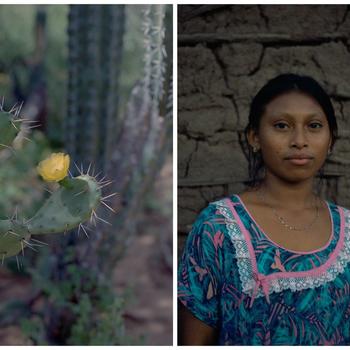Photography duo capture Wayuu’s fight for water, the ‘Treasure to win life’

Commissioned by WaterAid and British Journal of photography, renowned photographers Monty Kaplan and Marisol Mendez unite to create a multilayered response to the water crisis in La Guajira, Colombia.
1854 x WaterAid © Monty Kaplan and Marisol Mendez 2022
Wayuu communities in Colombia struggle with the access to safe water, food and health services. On average, one child under the age of five dies of malnutrition[1] every week, often in combination with diseases caused by a lack of safe water.
A 2020 Human Rights Watch investigation[2] found 96% of people living in rural La Guajira lack reliable access to potable water. The lack of nutritious food paired with the water crisis results in high malnutrition rates, diarrhoeal diseases and child mortality.
The Wayuu, the country’s largest indigenous group totalling around 300,000 people, live in the coastal desert region of La Guajira. Prolonged droughts, less frequent rains, and poor maintenance of existing wells are likely to worsen their access to water.
1854 x WaterAid © Monty Kaplan and Marisol Mendez 2022
In November 2021, on commission from WaterAid in collaboration with British Journal of Photography, storytelling duo Monty Kaplan and Marisol Mendez captured the lives of Wayuu communities and their fight for access to clean, safe water. The duo’s contrasting aesthetics echoed the diverse and delicate realities of the communities they encountered.
The pair spent most of their time in Pesuapa, a 105 people strong community of whom many have returned from Venezuela to escape the humanitarian crisis. The photographers explored the water issue, and particularly how the worsening crisis impacts women.
Their work is characterised by a merger of light and dark – a lyrical approach using colour, form and composition to create distinction. “Humanity is at the core of our approach,” says Marisol Mendez. “It was important to talk about this problem without shying away from how harsh it is – sometimes our experience as Latin Americans is very sugar-coated. People portray it exotically.”
1854 x WaterAid © Monty Kaplan and Marisol Mendez 2022
“Women have a difficult time managing water for their families – gathering the water, cleaning clothes and cooking,” says Monty Kaplan. Many Wayuu women travel hours to source water from wells or natural aquifers called jagüeyes.
“It doesn’t rain any more”, Daniela, the matriarch’s daughter told them. “We have to ration water. The lagoon is dry and the trees have fallen or been cut down for charcoal to sell.”
In one of the communities, an old borehole used to provide unsafe water, forcing people to buy water or endure disease. WaterAid works with local communities, installing a filtering system, handwashing and drinking facilities, and a shower, providing women and girls with a more private place for menstrual hygiene.
Natalia Leon, WaterAid’s Country Director in Colombia, said:
“The Wayuu are an ancient people, where women are authorities, artisans, carers, providers - and ultimately - water defenders. Women and girls walk for hours every day, sometimes at night to avoid the sun, to collect water, every step motivated by the need for what they call the ‘treasure to win life’.”
“With the community, we are fighting for clean water, decent toilets and good hygiene as they bring dignity, health and safety. With COP27 only months away, we are calling on world leaders to prioritise clean water for the world’s most climate-vulnerable groups – particularly women and girls.”
WaterAid x 1854 - The Climate Commission
In collaboration with 1854/British Journal of Photography, WaterAid commissioned three new photographic projects exploring the ways in which the climate crisis is making it harder for people to access their basic human rights of clean water, decent sanitation and personal hygiene — especially in some of the world’s poorest countries.
About Monty Kaplan and Marisol Mendez
Federico “Monty” Kaplan (b. 1986) is a photographer from Argentina, who is interested in photography as a tool of inspection. He examines and questions the perception we have of reality. Exploring intersubjective spaces that are shaped from the relationship between our subjective experiences and the objective nature of things. Kaplan searches for what is invisible to the eye and exists only as presentiment. His background in filmmaking allows him to create unorthodox narratives filled with atmosphere that blur the line between fiction and documentary.
Monty has exhibited widely with shows in USA, London, Germany and Argentina. His project The Measure was selected to be a part of the FOLIO masterclass with PHMuseum and Witty Books. His work has appeared on numerous publications, including It’s Nice That and i-D, among others.
Website: montykaplan.net/
Instagram: @monty.kaplan
Marisol Mendez (1991) is a Bolivian photographer that uses the camera to study the tension between truth and fiction, the tight relationship between what a photograph creates and the (sur)real it comes from. Through her photographs she seeks to deconstruct hegemonic narratives and confront them with the friction of the heterogeneous. Marisol employs a broad range of visual language to tell a story. The mixture yields an experience similar to that of a mystical journey where the viewer is challenged to absorb and reflect on the links that emerge across the images. As a result, her work oscillates between candid and staged, naturalistic and mythical.
Website: www.marisol-mendez.com/
Instagram: @marisol___mendez
[1] https://www.hrw.org/video-photos/interactive/2020/08/13/people-resilience-colombias-wayuu-indigenous-community
[2] https://www.hrw.org/video-photos/interactive/2020/08/13/people-resilience-colombias-wayuu-indigenous-community


